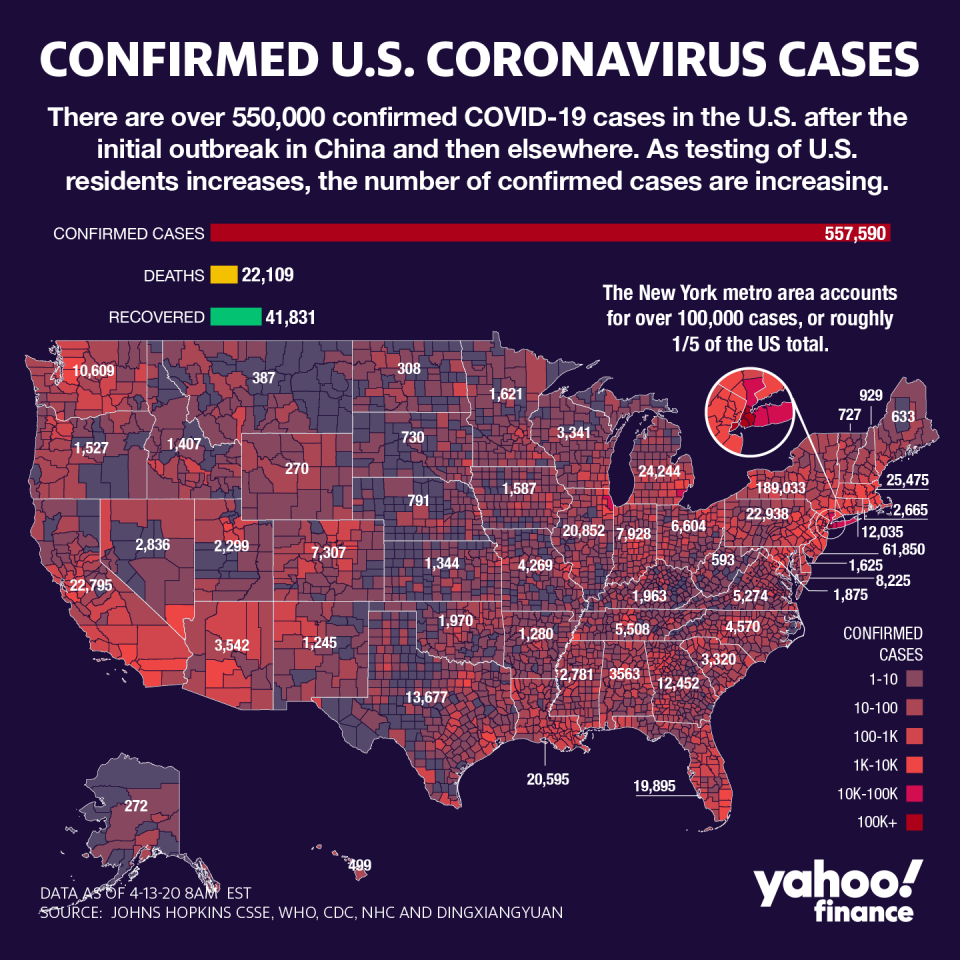Economist: Coronavirus a 'seminal event' that has 'no playbook' on how to recover
Plans to restart the U.S. economy must ensure that the coronavirus’ threat to public health has been contained, according to a top economist, because a resurgence of coronavirus cases could easily wreak more havoc.
A fissure has emerged between President Donald Trump and state governors about when stay-at-home orders can be lifted — and exactly who has the authority to do so — so that business activity can return to normal. However, the threat of a second wave of COVID-19, which has infected 2 million worldwide, has become an increasingly acute fear as a coalition of governors make plans to restore public life.
“You want to make sure the health crisis is addressed first,” Moody's Analytics chief economist Mark Zandi told Yahoo Finance on Monday, calling the pandemic a “seminal event” that will definitively alter American life for years to come.
“It would be a gamble to do otherwise because the virus may come back and do more economic damage,” Zandi added.
In a raucous press conference on Monday, Trump said the possibility of a new outbreak "does weigh on my mind” even as the president asserted he has sole authority to restart the economy.
Trump’s concerns were underscored by events in China, Singapore and South Korea, which are all contending with a new wave of cases that threatens to undermine previously successful containment efforts.
Zandi cautioned that officials need to be “very patient and cautious” when reopening, because the economic damage from a second wave would be “very difficult to address.”
Key to normalizing the economy will be rigorous mass testing, Zandi said, an area in which the U.S. has lagged badly, with its COVID-19 case count leading the world at nearly 600,000.
“It’s going to be a process and not going to be a straight line. It’s going to be learn as we go here, because there are no playbook [or] guidelines here,” the economist added.

‘Another couple trillion’ needed
The International Monetary Fund said Tuesday that the novel coronavirus will likely push the global economy into its worst recession since the Great Depression, as locked establishments prevent entire swaths of a largely sheltered population from working and spending.
The federal government has been racing to fill the demand shock created by widespread shelter-in-place orders that have thrown at least 16 million people out of work.
A looming deep recession that has Wall Street debating the shape of a recovery will lead to the unemployment rate topping 15%, according to Zandi — and will require Congress and Trump to come back to the federal well for new rounds of fiscal stimulus.
“My sense is we have another couple trillion in government support coming down the road,” the economist said, given that the economy is unlikely to fully normalize until effective treatments or a vaccine is available, which could take more than a year.
“We have a lot more government stimulus” in the works, he added.
The pathogen’s spread has created fundamental changes in business activity and consumer behavior — and Zandi suggested many of those changes could be permanent. Those shifts include scores of white collar workers working remotely, and virtual gatherings that have supplanted traditional meetings and undermined travel.
“I’d be surprised if this doesn’t change the way we do things for quite some time,” Zandi told Yahoo Finance, pointing to how the Great Depression “dramatically impacted” work and spending habits.
“This is going to have a long term impact on the way we live and the way we work,” he added.
[Click here for more of Yahoo Finance’s coronavirus coverage: Personal finance tips, news, policy, graphics & more from Yahoo Finance]
Javier David is an editor for Yahoo Finance. Follow him on Twitter: @TeflonGeek
Read more:
Wall Street cites Sanders as a rival to the coronavirus as a market risk
The stark reality of life under coronavirus lockdown is dawning on investors
Investors bet on Sanders after New Hampshire win as Biden plummets: Smarkets
Follow Yahoo Finance on Twitter, Facebook, Instagram, Flipboard, LinkedIn, and reddit.
Find live stock market quotes and the latest business and finance news

 Yahoo Finance
Yahoo Finance 
